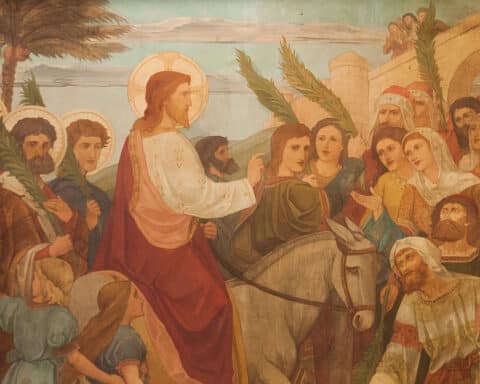
And now it is time for a rest.
Our Lord, as any good pastor does, calls the disciples back together for a retreat. For leisure. But word spreads quickly.
Crowds gather. They are hungry for the words that Jesus preaches. They are hungry for the healing that he offers.
Jesus does not send the crowds away, saying that he does not have time for such things. He is too exhausted.
His heart is moved to pity. In Latin, we refer to this as misericordia. It is the mercy of the heart, the kindness of God reaching out to the gathered crowds. He sees their suffering, and he begins to teach.
He teaches.
| July 18 -Sixteenth Sunday in Ordinary Time |
|---|
|
Jer 23:1-6
Ps 23:1-3, 3-4, 5, 6
Eph 2:13-18
Mk 6:30-34
|
For those of us reared in the educational systems of the United States, this might seem strange. He sees the suffering of men and women, he understands that they are hungry, and then he teaches.
Our conception of teaching is, well, rather didactic. When we think about a teaching document of the Church, we imagine it to be the kind of thing where we are told things. Told things that do not immediately interest us.
I am drowning in debt. Wondering about my future. Concerned about my children. And what I get is teaching.
But that’s not the teaching that Jesus offers. That’s not the teaching the Church offers.
Jesus interprets the Scriptures, speaks in parables and announces the kingdom of God. He is teaching about things that matter. He is the shepherd of the sheep that were once without a shepherd, leading them into a world of truth, goodness and beauty.
After COVID-19, after all that we have gone through as a social body in the United States — political conflict, racism and a pandemic that killed over 600,000 U.S. residents — we might think to ourselves, the last thing that we need is teaching. We need action, plans and a strategy for moving ahead.
And yet, let us listen to Our Lord. He calls us first to rest. Not the kind of rest that is apathetic or slothful. The kind of rest that allows us to listen to the voice of the Lord in our midst. He is here, speaking to us, teaching us.
After this pandemic, let us first spend time with Christ. Let us listen to his voice. Because he is still teaching us here and now.
For me — and I can only speak for myself when it comes to something so personal — I hear his voice most in the Blessed Sacrament.
After so much darkness, so much silence, so much violence, his presence in the Blessed Sacrament is the supreme act of teaching.
In that Host, which looks like nothing more than bread and wine, he gives himself to me. He does not overpower my affections; he does not force me to immediately recognize his very Real Presence but gives me the space and time to offer a return gift of love.
This is my Body. This is my Blood. Amen.
Coming out of this pandemic, entering the social unrest of my time, is not my Lord calling me to something more?
Jesus calls me to let my heart be moved by the suffering of my brothers and sisters.
He calls me to offer a comforting word, not beige indifference, through the presence of my body and my blood to those most in need.
Maybe, this kind of teaching is worthwhile after all.
Timothy P. O’Malley, Ph.D., is the director of education at the McGrath Institute for Church Life at the University of Notre Dame.





